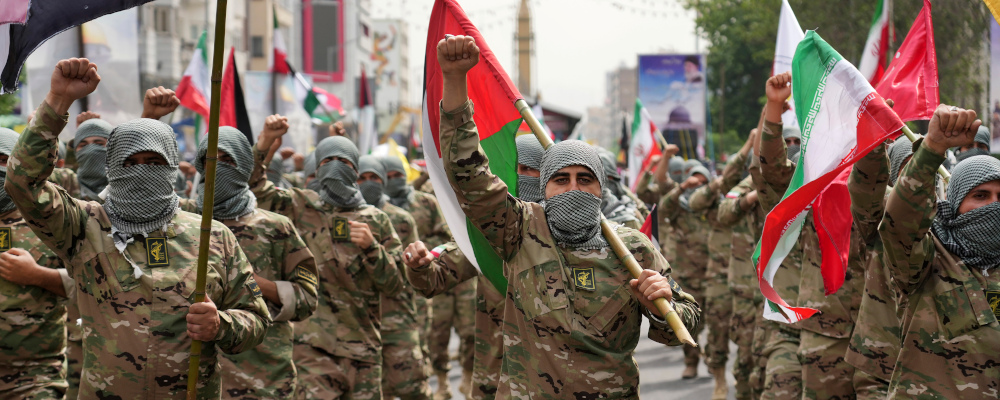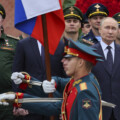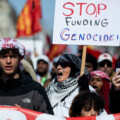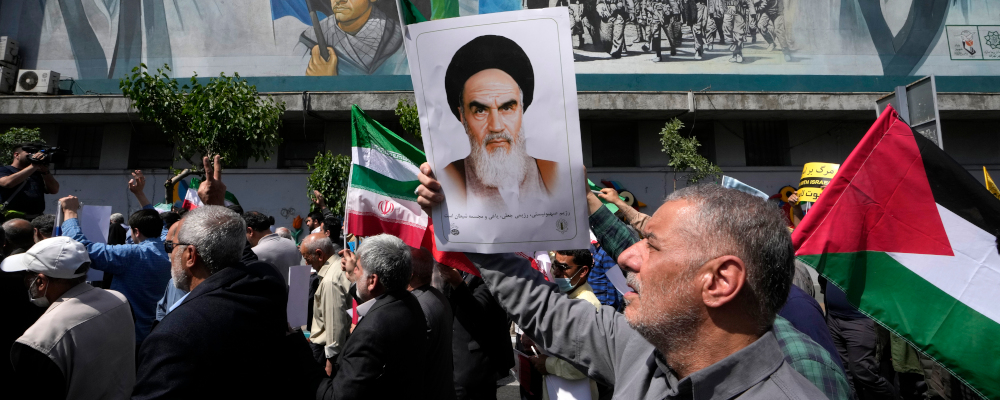“If you tell a lie big enough and keep repeating it, people will eventually come to believe it.”
These words were allegedly spoken by Joseph Goebbels, the minister of propaganda in Nazi Germany. They represent the entire political strategy of the Iranian regime today. No regime in the world repeatedly and blatantly lies with such effectiveness as the Islamic Republic of Iran. As someone who grew up under the Iranian regime, I am better than most at detecting these lies.
On April 1st, an Israeli missile attack on the Iranian consulate compound in Damascus, Syria killed seven high-ranking members of the Islamic Revolutionary Guard Corps (IRGC), two of whom were heads of operations in Syria and Lebanon. Twelve days later, Iran launched hundreds of missiles and drones at targets inside Israel. The interception of 99 percent of the missiles and drones by the Iron Dome, as well as the air defences of allies and regional partners, did not stop the IRGC and Ali Khamenei, the Supreme Leader of Iran, from telling tales of their victory.
On Sunday, April 21, at a publicly broadcasted meeting with members of IRGC, Khamenei thanked the commanders for “showcasing the glory and the determination” of the regime on the global stage. Some of the biggest Western and international media outlets have called Iran’s attack on Israel “historic,” describing it as the largest-ever drone strike in the world and the biggest missile attack in history. State-led media in Iran are now running stories on every and any single flattering word spoken by foreign journalists and analysts. Through their lies, they are tooting their own horn about how they defied and humiliated the “evil Zionist regime,” despite Israel’s sophisticated superpower military allies.

Meanwhile, Farsi and even some Arabic social media are filled with users poking fun at the pointlessness of launching more than 300 hundred drones and missiles at Israel with little to no damage to show for it. But Khamenei merely addressed this as a “peripheral issue,” insisting the real point of Iran’s attack was the demonstration of its military potency and its domination of Israel.
That he’s been unprepared to reckon with the military failure isn’t a huge surprise but it does prompt the question: Why was it such an apparent failure, when the IRGC is ostensibly so familiar with Israel’s defence system?
After all, they have been dealing with it for decades by attacking Israel through their proxies Hamas and Hezbollah. In reality, Iran always knew that it could not infiltrate the Iron Dome. The truth is the IRGC did not intend to. That’s why they chose to tell a big enough lie and used hundreds of missiles and drones to convince us that they really meant it. But as we Persians like to say, “Picking up too large of a stone means you won’t hit.”
The image of hundreds of missiles flying into Israeli airspace did however give some advantage to the Iranian regime. In the minds of people watching the news globally, particularly in Arab nations, Iran became an actual adversary to Israel. The current propaganda by the Iranian regime and its allies is focused on maximizing that image and legitimizing Iran as a big player. The attack on their consulate forced Iran’s hand into directly attacking Israel, after decades of hiding in the shadows.
So naturally, they will capitalize on it and spin the optics in every possible way to score international and domestic political points. To pro-Palestinian civilians in Arab countries, Iran’s attack on Israel was a moment of revenge. It was a glimpse of hope that someone can stand up to the so-called “Zionist bully” in favour of the people of Gaza.
Their Arab governments may not feel the same way, but people in Arab nations (and even here in Canada) celebrated Iran’s attack, and the Iranian regime’s popularity among Arabs has reached new heights. On Instagram, bloggers were posting the Iranian flag as their choice for who they’d bet on to win a third World War started by Iran and Israel. In parts of Iraq and in several other Arab countries, people took to the streets to cheer on Iran’s actions by waving Iranian and Palestinian flags.
And yet within Iran, the majority of Iranians and political dissidents reject the regime. But they deeply fear a foreign invasion or war. The recent attacks took place at the same time as Iran has been cracking down on women defying strict Islamic dress code laws, which has led to a lot of criticism directed at the regime. However, the regime uses the fear of war and instability to silence Iranians into submission. For many years, Iranian leadership has accused political dissidents of having plans to turn Iran into another war-torn Iraq or Syria. There lies yet another lie.

Iran’s attack, however symbolic, hurt Israel’s image of supremacy in the region, so Israel decided to send a message to re-establish deterrence. Iran’s state-led media reported that “three small drones” from Israel were seen and shot in Isfahan. They said Israel’s attack was so small and unimportant that it was not worth talking about. In reality, Israel launched a missile that, without any interception by the Iranian military, hit an air defence radar in the central Iranian city of Isfahan that guards the Natanz nuclear facility. The message was clear: don’t play with fire or Natanz will be next. However, Iran knows Israel had to act and it has no intention to escalate. At this point, neither Iran nor Israel want a direct conflict. Israel has dozens of its citizens held hostage by Hamas and can not afford to be distracted.
While the Western media is still talking about the size of Iranian missiles and the threat of regional instability, Iran hides its true internal worries. And they are not about Israel.
Iran is facing an internal crisis in Syria, where it is suspected a group within Bashar al-Assad’s regime, who are unhappy about the presence of IRGC in Syria, are leaking information about the location of IRGC members to Israel. Naturally, Israel has been allegedly using this information to take action and assassinate high-ranking generals of the IRGC.
The bigger, more painful issue that Supreme Leader Khamenei is facing right now is the backstabbing and treason of his major allies and the waning regional influence this represents. The Iranian regime’s dream of building its empire has been shattered by this betrayal. Iran’s attack on Israel was not so much a show of force against Israel as a warning to its treacherous proxies. These were warning shots to those trying to cut the IRGC out of Syria, Lebanon, and other territories of interest to the Islamic regime of Iran.
Recommended for You

Need to Know: Mark Carney’s digital services tax disaster

‘Putin has no intention of stopping this war’: Sir Bill Browder on three years of war in Ukraine and how Russia is evading sanctions

Alan Kessel: Genocide, weaponized: How a legal term became a political bludgeon

Rudyard Griffiths and Sean Speer: The case for a Nobel Peace Prize for Donald Trump




